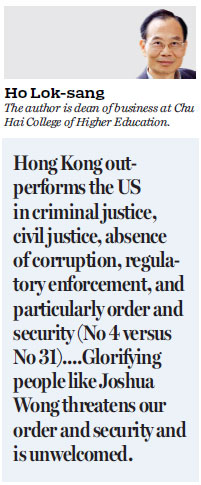'Occupy Central' promotes neither peace nor justice
Updated: 2018-02-06 07:46
By Ho Lok-sang(HK Edition)
|
|||||||
Ho Lok-sang notes irony of nominating a trio who trampled on everyone's rights to thoroughfares and impeded emergency vehicles for a revered global 'peace prize'
What an irony it is that a team of US congressmen nominated Joshua Wong Chi-fung, Nathan Law Kwun-chung, Alex Chow Yong-kang and the "Umbrella Movement" for the Nobel Peace Prize! Although the "Umbrella Movement" itself was not physically violent, it was a serious violation of others' rights - denying them of the use of the thoroughfares of Hong Kong - which could delay emergency vehicles and life-saving ambulance services. It was also a forerunner of quite a few violent incidents, particularly the riot in Mong Kok in February 2016. Although in name it was a "pro-democracy" movement in fact it was an attempt of some members of the community to dictate their ideal on others. In survey after survey, HongKongers opposing "Occupy" outnumbered those who supported it. Yet the "pro-democracy" activists insisted on "Occupy". Although in name it was against prescreening for a public vote, in the December 2013 "New Year Civil Referendum" to decide what political reform Hong Kong people wanted, "pro-democracy" organizers screened out all political reform proposals other than three, all of which included "public nomination", even though the others were also endorsed by international experts. Hong Kong would certainly have been better off without the "Umbrella Movement". Hong Kong had become less peaceful with the likes of Wong. How could they deserve a nomination for a peace prize?

Clearly, the United States is keen on exporting its brand of democracy. Yale professor Amy Chua in her book World On Fire: How Exporting Free Market Democracy Breeds Ethnic Hatred and Global Instability chastised this American self-righteousness. According to Chua, in countries where an ethnic minority is disproportionately wealthy because they prospered on the back of the free market, democracy could lead to a backlash. The backlash could be against markets in which some minority thrived; it could be a backlash against democracy as the market-dominant minority tried to influence the results of the popular vote; it could be violence directed against the market-dominant minority itself. Hong Kong is relatively homogeneous in ethnicity but a characteristic of free market economy under globalization is wealth disparity. While we need to address the problems it is not self-evident that democracy American style will necessarily resolve these problems or benefit Hong Kong over the long term. Why should the US dictate one form of government on other jurisdictions, when it is not even able to get its house in order?
In order for the world to be more peaceful, politicians need to put themselves in the shoes of others. The trio which the US congressmen nominated for the Nobel Prize had failed to consider other people's needs and rights. They had actually been convicted in Hong Kong's courts. Hong Kong Human Rights Watch and some Western press called them "political prisoners" but the fact is that they had done unlawful acts. Why should anyone be given impunity for violating other people's rights just because they were pursuing a political goal? That would be very dangerous. Just as court Vice-President Wally Yeung Chun-kuen in the trial said: "To disrupt public order and public peace in the name of free exercise of powers will cause our society to descend into chaos."
Some commentators said the trio had been given a community service sentence or a suspended sentence for the unlawful assembly conviction and that appealing the sentence was politically motivated and called them political prisoners. One US law professor commented in Chinafile.com: "They are of course political prisoners. This is not a case where people are accused of stealing fish. The defendants' actions were political, and so is the government's prosecution." I would advise this commentator to look at the act and just call a spade a spade. If his logic carries, convicting a murderer who murdered someone because of a political motive would be a political conviction. Putting him in prison would be making a political prisoner of him.
The US has many fine institutions. Freedom of speech, freedom of the press, and separation of the church and the state are some of these. But its political system has many flaws, and this has been noted by political scientist Francis Fukuyama in his recent book Political Order and Political Decay. According to Fukuyama, the US sorely needs to restore a right balance between state, law and accountability. Among other things, electoral democracy has often degenerated into clientelism - the phenomenon of politicians serving constituents by trading economic favors for votes, which erodes the foundations of public accountability. It should respect other countries' right to experiment with alternative political systems.
According to the 2017-18 World Justice Project report, Hong Kong's rank in the rule of law index is 16, above the US's 19. Hong Kong outperforms the US in criminal justice, civil justice, absence of corruption, regulatory enforcement, and particularly order and security (No 4 versus No 31). Hong Kong is only slightly behind the US in open government and moderately behind it in fundamental rights and constraints on government powers. Glorifying people like Joshua Wong threatens our order and security and is unwelcomed.
(HK Edition 02/06/2018 page9)